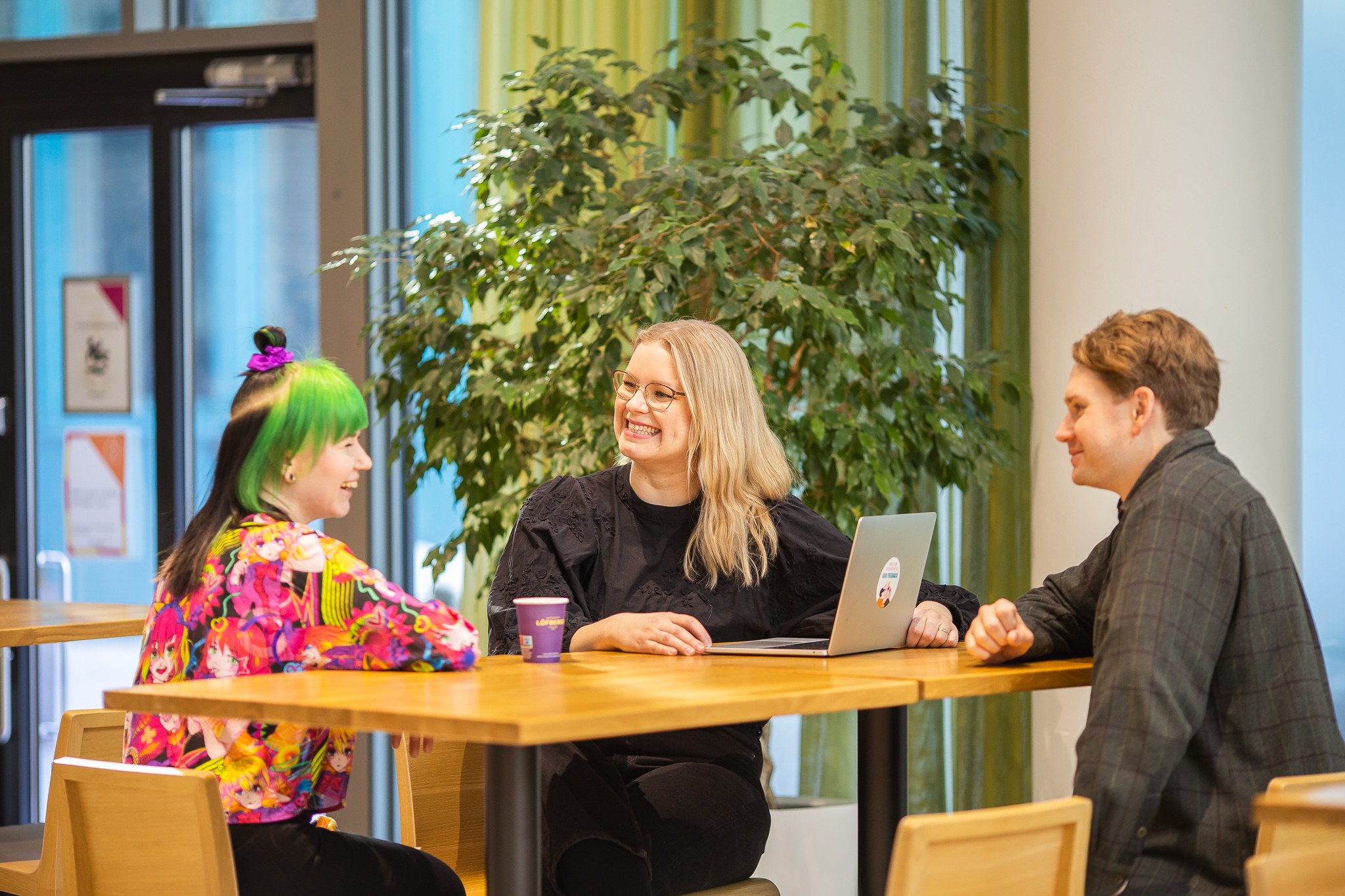Work life is undergoing a change that we need to understand better, and while doing so, learn something new. Well-being at work – and along with it, succeeding, developing, and staying focused – seems to revolve around our minds. Why do you think it is so?
Why mental well-being matters at work
Life, as well as work, today seems to demand new kinds of emotional and mental skills: self-knowledge, emotional intelligence, and situational awareness. These are particularly important in people leadership and management roles. But when you think about it, aren’t they important in all interactions and as a part of self-leadership?
Overall, it feels like the mind and emotions are playing an increasingly important role in the workplace. Could it be that, as a result, we listen to ourselves and each other more carefully? Maybe we are also becoming more sensitive to recognising the signs of exhaustion? And that we now seek help more often from professionals rather than from each other? Perhaps that explains the outcome of some research, in which one in ten men and nearly one in five women have used health services for mental health issues.
Mental well-being is now emerging as a serious challenge to our nations’ competitiveness. It is about deep-seated societal expectations and structures, but also real and imagined demands related to work life. In the end, this is about each of us and how we care for our own minds. And undoubtedly, it’s also about our own changing attitude toward our own minds.
Discussions often focus on one perspective: what can be improved in workplaces, what should society do differently, or what an individual can do. We feel that solutions lie somewhere where it’s safe to talk about all these aspects at the same time.
How can we, amidst all this problem talk, shift our focus to our own choices and actively help each other?
Why does Gofore care about this?
Gofore has a well-earned reputation as an employer offering excellent work-life flexibility, comprehensive well-being services, investments in leadership, and a human-centred culture. In terms of well-being at work, we may feel like we’ve won the lottery, as also our colleagues are top-notch, educated, and empathetic experts.
Additionally, it’s important to us that mental health challenges can be raised safely, and help is easily accessible. So, are the mental health statistics of Gofore the best in the industry? Not really! Do we believe we’re immune to the increasing trend of mental health symptoms? No, we don’t. Even though we’ve done many workplace-related things exceptionally, is that enough from an employer’s perspective? No, we can definitely improve.
Even though things are going well overall, we want to support people even better. That’s why we want to learn more about this phenomenon and see where it takes us. We have fantastic partners specialising in health and work ability management, but we feel that we might need a larger group of people to tackle this issue.
General fact: In Finland, the loss of work effort due to long-term mental health-related absences in 2023 was estimated at 5.8 million workdays. In addition to human suffering, this caused at least one billion euros in costs (Kela data source, in Finnish).
Data of Gofore: About 6% of Gofore workforce is on sick leave for mental health reasons annually. For us, this meant 3,984 absence days, or 17.5 work years in 2023, when Gofore had 1,242 employees in Finland.
According to our occupational health partner, the main reasons are not work-related but since we believe that work can have an impact, we want to investigate this further.
🧡 Gofore Action 1: Awareness is the first step
As a publicly listed company, Gofore is committed to open and transparent investor communication. Since our journey on the stock exchange began, we have reported our revenue and key employee-related metrics on a monthly basis.
Now, we are taking the next step in transparency: we will start reporting data on mental health-related sick leaves in Finland at Gofore.
Why?
Supporting and doing research on mental health and work ability is important. It weighs heavily on our society, both humanly and economically. We want openness and dialogue around the issue: why does the mind get burdened, even to the point of getting ill? By doing so, we bring actions alongside concerns into the discussion: what can companies, organizations, communities – we as a society – do? We’ll soon share more about our actions around this topic!
Women’s mental health in the headlines
It is said that the lion’s share of emotional labour in the workplace and mental labour at home falls on women’s shoulders. The high demands of today’s society and the feeling of inadequacy affect all of us, but is there still something gendered in this phenomenon? Are women facing more continuous and conflicting expectations than others?
Is it true that in work communities women tend to keep uncertainty inside and struggle to recognise their own boundaries – more so than others? Is it also true that a larger proportion of women than men are burdened by conscientiousness and the pursuit of perfection from childhood? Something that follows them into their school years and then into working life?
We are reforming work life to be more family-friendly by extending paternity leaves, offering paid parental leave, and broadening the concept of close family. But is there still something challenging and undefined in families and communities that falls on women’s shoulders?
At its core, the question is: in what kind of a society can a person feel well and endure? And how much we, as women, are willing to develop the skills that lead us towards better well-being. Here would also be an opportunity to find ways of supporting each other better.

But this doesn’t seem to end here. A recent, interesting study highlights how traditional notions of masculinity and femininity have set norms for how people respond to health issues. As gender perspectives shift, this has consequences also for psychological vulnerability. Studies have shown that young men are increasingly seeking psychological help and that mental vulnerability has also spread to male-dominated industries.
Fact: Mental health-related sickness benefit days paid to young women were five times more in the past few years than in 2005 (Finland).
Data of Gofore: At Gofore, women are twice as likely to be on sick leave for mental health reasons than men (2021-24).
🧡 Gofore Action 2: We Do Mind – After Works: Learning from each other
Health data shows a difference between the situations of men and women. If we can bear this binary division for a moment to examine the phenomenon, we may find a way to talk about our personal and socio-cultural expectations and assumptions. We want to continue the conversation and share thoughts on how we can support each other better. What are the things that protect men from burnout, and is there something we can learn from that? Are there aspects or phenomena in women’s work lives that men should understand better?
We are organising “We Do Mind” after work sessions for Gofore employees, where we will dive deeper into the topic through facilitated discussions. Before the after work events, we invite all Gofore employees to share their thoughts on the theme.
Of course, we’ll share afterward what we have learnt: is there something different in the work/life experiences of men and women? And most importantly, what can we do at work to help when challenges become overwhelming?
Social impact
Brain health and well-being are themes that have great significance not only in individual lives but also on a larger scale for national competitiveness and the future.
🧡 Gofore Action 3: Gofore Impact Foundation seeks and supports new solutions
The Gofore Impact Foundation team has also decided to explore the possibilities of supporting a research project that creatively combines mental health and digitalisation. One interesting question could be, for example: does the digital world, at work and home, somehow make us mentally more vulnerable? And how could it prevent that from happening? More information is coming soon. It’s exciting to see what kind of impact we can achieve through this!
What’s next?
We will continue the conversation, learning, and taking concrete actions. Students and their thoughts on sustainable working life are also on our radar as we’re working on this topic with our Future Talent Partner network.
How? You’ll hear more about this soon!



